New book tells story of how one family wrote its name into Scottish rugby and football history: Gordon and Peter Brown, their goalkeeping father and the US World Cup pioneer
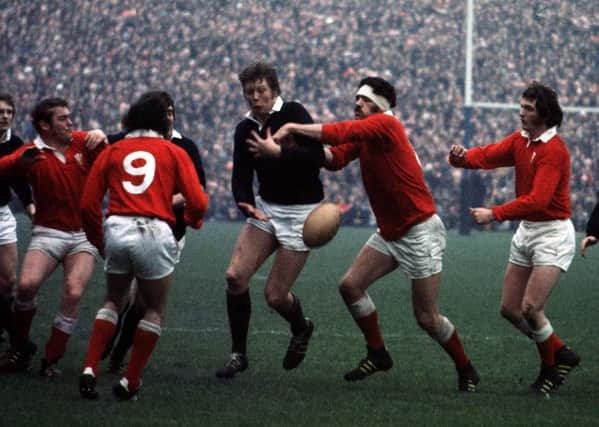

But its origins are firmly rooted in Troon and the Brown family will forever be associated with the Ayrshire town. Now two of the Brown scions are pulling together the various strands so the stories can be preserved and shared.
Chief among the cast list are the two rugby heroes: the late Gordon, better known as Broon frae Troon and a Lions tourist par excellence, and his older brother Peter, the redoubtable No 8 who kicked goals with a distinctive front-on run-up and captained Scotland to three Calcutta Cup victories over England, including the never-to-be-forgotten 16-15 nailbiter at Twickenham in 1971 when he landed a last-gasp conversion.
Advertisement
Hide AdAdvertisement
Hide AdTheir father Jock had also represented his country, but at football, excelling as a goalkeeper with a knack of saving penalties. He won the Scottish Cup with Clyde in 1939 and the league title with Hibs nine years later and would surely have added to his single cap had the war not interrupted, also scuppering a move to Arsenal.
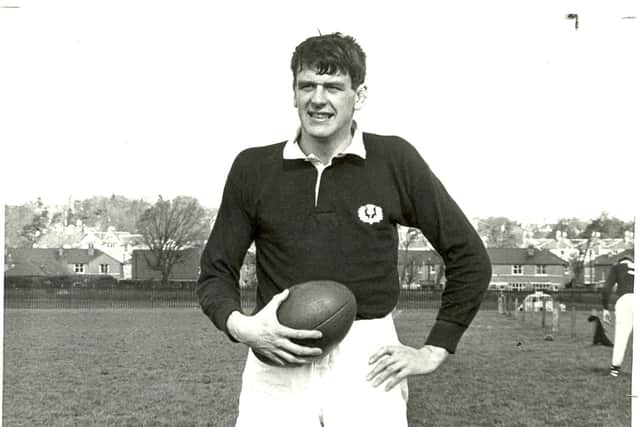

Two of Jock’s brothers also played football professionally, with Tom, also a keeper, turning out for Ipswich Town and Jim, a forward, carving out a unique place for himself in the game.
He played in the first ever World Cup, but for the United States, not Scotland, helping them reach the semi-finals in Uruguay in 1930 and becoming the only Scots-born player to score in the last four. A strong-minded trade unionist whose principles had been forged during his apprenticeship as a ship’s riveter in Troon, he was not one to bow to authority. A bit like his nephew Gordon.
Jim’s son George also had a storied soccer career in the US and it is his son James who has just put the finishing touches on Mud, Blood and Studs, the book which tells the family’s story.
Gordon’s son Rory, meanwhile, has been collating ephemera from his father’s glittering career which included 30 Scotland appearances, three Lions tours and induction into World Rugby’s Hall of Fame. The aim is to have them displayed at Murrayfield and, hopefully one day, in a Scottish rugby museum.
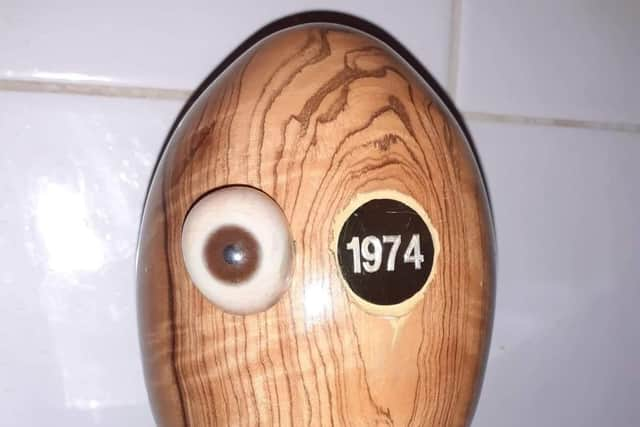

Some of the collection is already on show in the national stadium, including what must be one of the most unusual pieces of sporting memorabilia, as Rory explained: “Did you ever hear the story of Cyclops, the guy with one eye? Well the month before my dad died there was a dinner held for him down south and big Cyclops made a surprise appearance. My dad couldn’t believe it. He’d been telling this story for years and here he was. He hadn’t seen him since the incident.”
The “incident” dates back to the 1974 British & Irish Lions tour of South Africa, a series so violent that the Lions’ infamous “99” call became a byword for on-field mayhem.
During one such barney, Brown hit his opposite number, Johan de Bruyn, so hard that the South African player’s glass eye flew out and landed in the mud.
Advertisement
Hide AdAdvertisement
Hide Ad“So there we are, 30 players plus the ref, on our hands and knees scrabbling about in the mire looking for this glass eye,” recalled the great lock forward in the book, 125 Years of the British and Irish Lions. “Eventually, someone yells ‘Eureka’ whereupon de Bruyn grabs it and plonks it straight back in the gaping hole in his face.”
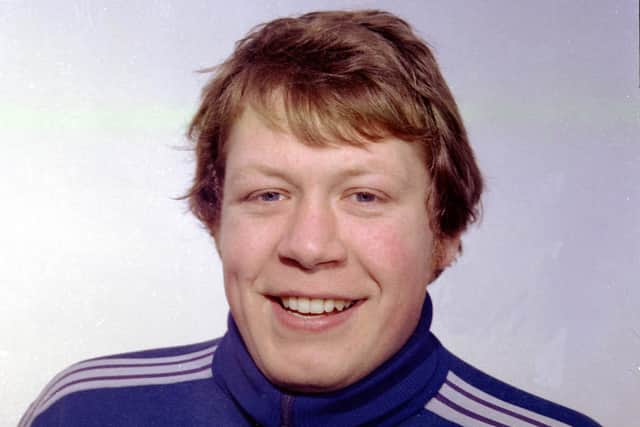

Twenty-seven years later and Gordon Brown was in the final stages of his battle with non-Hodgkin lymphoma which would claim his life, aged just 53. The great and good of the rugby world had assembled for the dinner but, unbeknown to Brown, waiting in the wings was the man known as ‘Cyclops’, ready to make a dramatic appearance.
Rory takes up the story again: “So de Bruyn presented him with this plinth with a beautiful handmade wooden rugby ball with the glass eye stuck on it, and said ‘here you go Broony, this is so I can keep an eye on you!’
“So that’s in the display case at Murrayfield. At first they weren’t too sure but I told them, ‘Put it in, put it in!’ and they said they were glad they did because it’s the biggest talking point of the display.
“They don’t have a museum at Murrayfield, so it’s been in a case in the President’s Suite. So it’s really just for the players and other guests before and after matches.
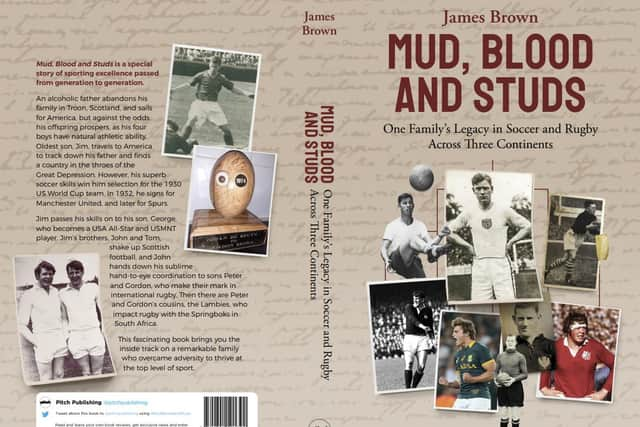

“It’s just me testing the water, putting all my dad’s stuff together and seeing how it’s received. I’ve loved doing it and it’s gone down well so I’m just going to keep doing it because my dad gathered so much stuff.
“For years we’d be tripping over it and saying ‘what is this rubbish?’ Now I’m turning it into a properly itemised collection.
“Occasionally, my dad would dig out a shirt and go, ‘that’s Peter Whiting’s’ and he’d tell me a couple of stories and the shirt would disappear again. I’ve loved doing a bit of detective work which I know Jimmy has been enjoying doing on his side as well. There are so many bits and pieces, not just shirts but mementoes, caps, Hall of Fame awards. It’s fascinating and my Dad would have loved to have had it all on display in one room but I don’t think my Mum was having that.
Advertisement
Hide AdAdvertisement
Hide Ad“Ideally I’d love to have everything out, on display, even if it was just for a couple of days, just the way my Dad would have liked it.”
While Rory has been curating his father’s collection, his second cousin James was interviewing team-mates and opponents of Gordon and Peter, and researching his own father’s and grandfather’s footballer careers, for his book.
It is due to be published in late August and will be an unvarnished look at a family that split apart and then came back together. The American dimension came when Rory and James’ great grandfather, Jim senior, left for the US, leaving his family behind. His son, also Jim, headed stateside to find him. They met up but the relationship never really recovered. Nevertheless, Jim jnr stayed in America and soon flourished as a footballer in New Jersey, culminating in his call-up for the US national side and his historic role in the inaugural World Cup in Uruguay.
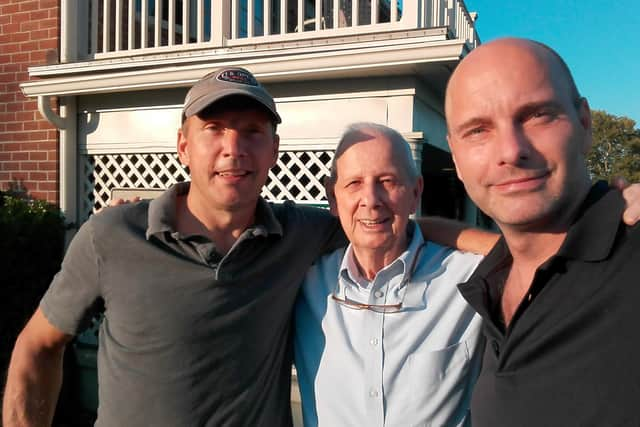

By June 1930 he was granted US citizenship and played in all three of their matches in Montevideo, scoring the only goal in the 6-1 loss to Argentina in the semi-finals.
“It’s the furthest America have ever gone,” said James, an immensely proud grandson. “And he’s the first ever Scot or American to have ever scored in the semi-final of a World Cup. And I hope it doesn’t stay that way!”
Born and raised in the US but now living in France, James was immersed in football from an early age. His father George was a professional, a highly regarded outside right who was capped by the US national side in a World Cup qualifier, and James himself played semi-pro after winning a scholarship to Rider University in New Jersey.
As well as family chronicler, he is vice-president of the Society for American Soccer History and has bonded with Rory over their shared desire to ensure the achievements are properly recorded.
“We want to make sure it’s well documented, well preserved and presented in the best way,” James said. “It doesn’t mean that all the stories are fluff and that everything is positive and everything is great. But that’s what family stories are all about and I love that because that’s reality.”
Advertisement
Hide AdAdvertisement
Hide AdThe stark reality for the Browns is that Jim’s role as a US soccer pioneer came about as an indirect result of his father walking out on the family.
“That’s really where the story begins,” Rory explained. “He came back from the First World War and quickly left for the States, leaving his wife and eight kids. That’s what split the family.”
Over a century later, James has pieced together the whole story.
“It all started out from this desire to pass something down to my son so that he understood what my side of the family was all about,” he said. “He’s heard those stories, just like I always heard those stories. But then at some point I said, ‘listen, I’m tired of just hearing the stories’. I’d never read a match report or a newspaper article. So that’s what I did about six years ago.
“I knew access to family would yield very personal items and things we don’t see in the books, like When Lions Roared or other general books about those famous tours. I wanted something that came from the heart and came from the family and hopefully it makes this stick out a lot more.
“So six years of research and interviews with family members and connecting with people like Rory. Rory and I grew up on both sides of the pond and we only knew each other because of events. It was that more and more things were happening in our family that allowed us to come together.
“And in my research I was like, ‘listen your Dad and your uncle Peter were just absolutely fantastic and I want to get to know you more and to know them more intimately’. So Rory and I have been having a blast.”
Father-son relationships are key to the Brown story. While Jim senior and junior struggled to repair their bond, the connection between Gordon and Peter and their dad Jock, and between the US-based generations of Jim, George and James were enduring and helped their offspring flourish.
Advertisement
Hide AdAdvertisement
Hide Ad“One conversation Rory and I had recently was about the father-son relationship, and the care and nurturing of a son’s ability and the efforts you make as a father to nurture those skills and abilities that are there and you feel could be beneficial,” said James. “The purest example was my grandfather.
“After World War II they moved back to the US. My grandfather was about 41 and had emphysema but he said, ‘listen, my son is 15 and I want to help him, I want to nurture that ability I see in him’. So he re-started the Connecticut soccer league and he also created a team, Greenport United, and he played with them, just to have that on-field experience and mentoring, and those talks that you have before the game and at half-time and afterwards and when you go back to the house. There was no better or stronger influence than my grandfather on my father’s career.
“He was quite, quite fortunate and we see that with John and Peter and Gordon. All that training at home, all the exercises and time John would spend with Peter and Gordon. Peter was more studious and methodical; Gordon just loved to get out there. He was less of a club man and more of a man for the international stage.
“He definitely gave more of his time and dedication when he knew a tour was coming up, when there were international matches. And I love seeing and understanding from friends and families how these two [Peter and Gordon] went about getting ready for games, or getting ready for seasons, or tournaments. It’s a wonderful father-son relationship that is being told in this book.”
For Rory, now based in the Highlands where he is a drystane dyker, the last couple of years have given him time to consider the impact his father made on Scottish sport.
“With lockdown everything stopped and it gave me the chance to focus on the collection. It also gave me time to reflect on my life. For years, people had always asked me what is it like to have Gordon Brown as a Dad. And I was like, ‘Well it’s my Dad, I don’t know any different’.
“Now I’ve spent half my life without him and I can now see him as other people see him. So not only can I see him as my Dad, I can see him the way everybody else does. So putting this together, I couldn’t be more proud.
“Looking at my Dad’s career, it’s not all positive. He had a few ups and downs and not everybody agreed with him!
Advertisement
Hide AdAdvertisement
Hide Ad“And over the years whenever I have met ex-players from Dad’s career, whether they were English, Kiwi or whatever, the warmth that they’ve showed to me, they’ve accepted me as part of the family as well.
“One of my Dad’s last requests was when we were organising his funeral. We said to him, ‘Who do you want as a pallbearer?’ He said ‘I want the English!’ So we had Fran Cotton, Roger Uttley and Bill Beaumont. My Dad said, ‘They can carry me because I carried them throughout three Lions tours!’
“So even up the end he still saw the humour in things and that was part of his character, sharing these stories. And that is what Jimmy and I want to do.”
Comments
Want to join the conversation? Please or to comment on this article.

